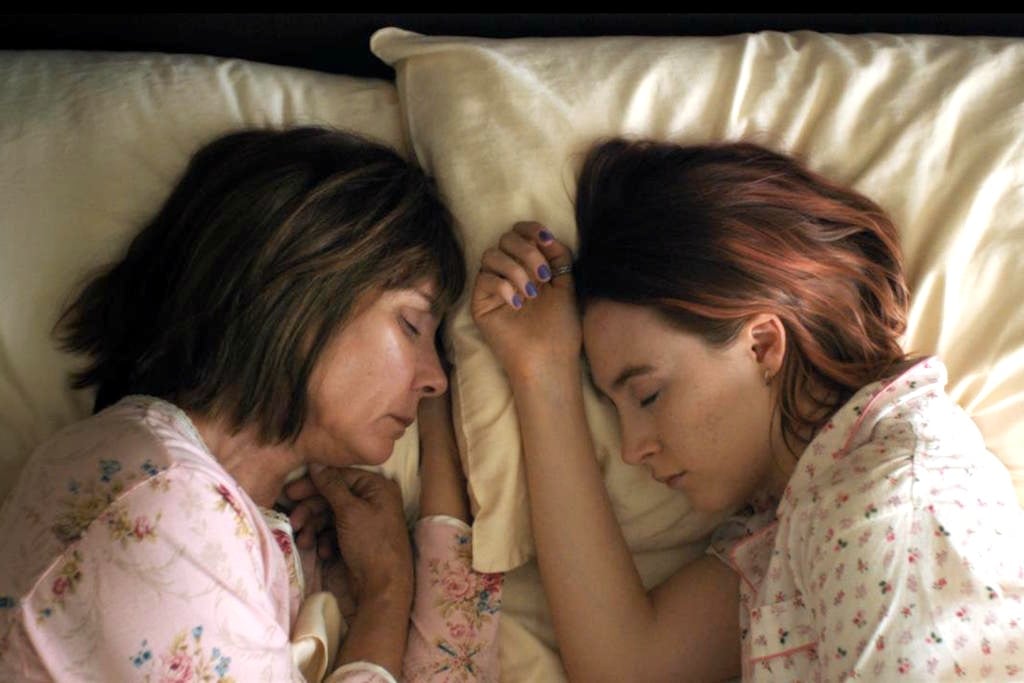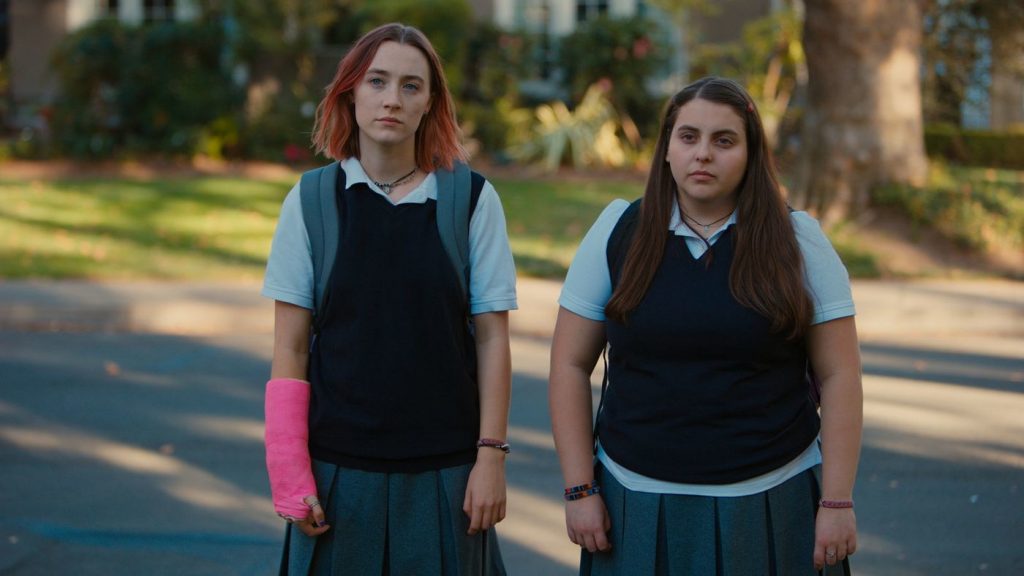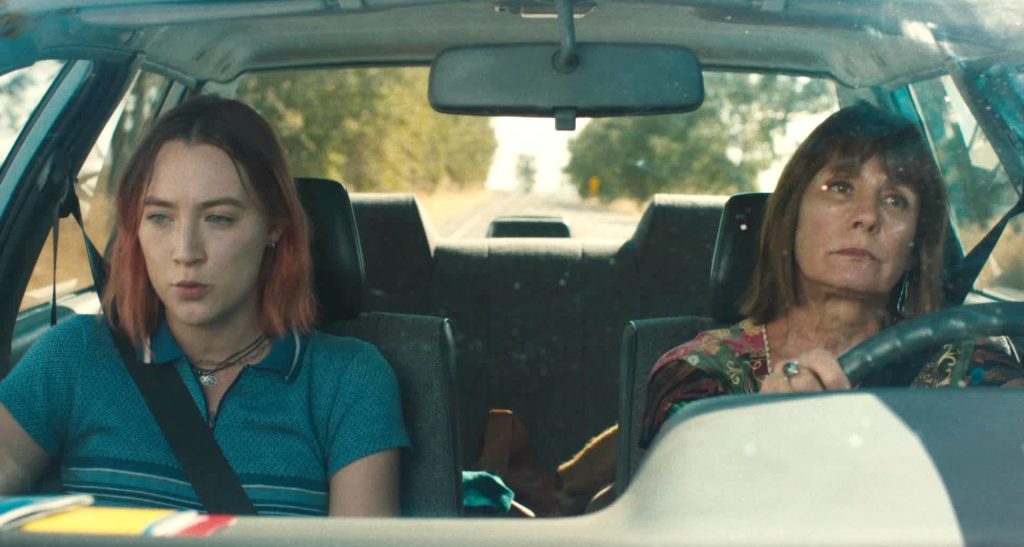With ‘Lady Bird’, We’ve Finally Got A Film That Nails The Mother-Daughter Relationship
Greta Gerwig's exploration of a teenage girlhood rings true.

Familiarity. That’s the power of Greta Gerwig’s assured directorial debut. In a coming-of-age genre that’s often crowded with big angst and drama, Lady Bird is a warm, unassuming film. But it’s disarmingly fresh and precise in its exploration of a teenage girlhood that rings true.
I’ve previously observed that what makes Gerwig so loveable as an actor is her performance of transparency. Gerwig gives the viewer permission to recognise what her characters can’t see about themselves; she thins the fourth wall so that the character feels completely known to the viewer. Behind the camera, Gerwig continues to create this feeling of recognition — and she makes it appear effortless and charming.
Much less acerbic than last year’s anti-nostalgic The Edge of Seventeen, Lady Bird is a special film because of the kindness of Gerwig’s transparent gaze: not just at protagonist Christine ‘Lady Bird’ McPherson (Saoirse Ronan), but also her friends and family, and especially her mum, strong-willed psych nurse Marion (Laurie Metcalf).
For Christine, growing up means finding her own transparent gaze. She must stop obsessively seeking to build an ideal self, and instead learn to see herself and her surroundings with Gerwig’s fondness.
The Very Best Version Of Yourself
It’s 2002 in Sacramento, California, and as her final year of high school begins, Christine is gripped by that wild and utterly familiar teenage conviction that to be her best self is to become someone else, somewhere else, somewhen else. (“The only thing exciting about 2002 is that it’s a palindrome.”) To Christine, ‘Lady Bird’ is her true given name, because “it was given to me, by me”.
Identity and identification lie at the heart of the coming-of age genre, whose central conceit is that we emerge into adulthood once we can find easy answers to that existential cry, “Who am I?” Lady Bird dissects this bumbling, frequently embarrassing process without ridicule. Gerwig invites the viewer to remember how it felt to try on different selves: to be a tryhard and a blowhard; to be arrogant and fragile; to treat those around you with unthinking cruelty; and to hope it gets better despite your fear you might already have peaked.
What I love about Lady Bird is that Christine isn’t at all special. She’s decidedly average. Her guidance counsellor (Carla Valentine) bursts out laughing when Christine expresses her aspiration to go to an Ivy League college: “You definitely won’t get into Yale.” And the principal of her Catholic high school, Sister Sarah Joan (Lois Smith), kindly points out her Math Olympiad chances are low because maths isn’t her strength.
“That we know of. Yet,” retorts Christine, in one of many uncanny moments in which Ronan’s delightful performance seems to ventriloquise Greta Gerwig’s own style as she speaks Gerwig’s dialogue. Lady Bird is based on Gerwig’s own teenage years, and at times director and star seem simultaneously present onscreen, like the holographic sex scene in Blade Runner 2049.

Christine’s story of herself as Lady Bird is constantly undermined in ways that totally throw her. She’s gutted when her best friend Julie (Beanie Feldstein) gets the lead in the school production, and when her John Green fantasy boyfriend Danny (Lucas Hedges) turns out to have his own unrelated struggles. With a teenager’s blithe savagery, she dumps Julie for cool girl Jenna (Odeya Rush), and swaps Danny for Kyle (Timothée Chalamet), an endlessly pretentious bad boy whose band L’Enfance Nue gigs at the local coffee shop.
This genre requires Christine to swim free of all this nonsense to find her ‘authentic self’. But Lady Bird also acknowledges that whoever we become, we remain entangled with those around us. Gerwig lets us glimpse the interior lives of even small characters in the film, from Julie and Jenna to depressed drama teacher Father Leviatch (Stephen McKinley Henderson) and his replacement, hapless sports coach Father Walther (Bob Stephenson). It’s beautifully detailed and empathetic.
A ‘Mum-ing-of-Age’ Drama
Lady Bird isn’t just familiar — it’s familial. There have been plenty of films focusing on mother-daughter relationships, from the sentimental (The Joy Luck Club) to the sarcastic (Postcards from the Edge) to the downright sadistic (Precious). But Lady Bird insightfully suggests that mothers and daughters aren’t antagonists, best friends, or mysteries to one another, but instead are similar selves whose conflict comes from their continuity.
Christine and Marion are like two magnets whose identical poles repel each other: “You both have such strong personalities,” Christine’s father Larry (Tracy Letts) tells her. Throughout the film, other characters praise Marion to Christine, who rejects their assessments, because she rejects the idea of identifying with her mother.
Yes, we can see that Marion is endlessly frustrating to her daughter. She crushes Christine’s silly fantasies by reminding her of her academic and financial realities, not understanding how life-sustaining those fantasies are. Yes, she says, “Please stop yelling” when Christine is not yelling; she is merely speaking angrily. Yes, she calls her daughter ungrateful for not recognising the sacrifices Marion has made to keep the family afloat during Larry’s unemployment.
But thanks to Metcalf’s zestful performance and Gerwig’s deft script, we, the viewer, can also see Marion as she sees herself. We see the fragility of her middle-class pride as she struggles to keep up genteel appearances as the sole breadwinner while living “on the wrong side of the tracks”.

She’s a woman whose care is practical. She stays up all night fixing an op-shop dress so that Christine can look beautiful when she meets Danny’s rich family for the first time. She takes in her eldest child Miguel’s (Dance Academy’s own Jordan Rodrigues) girlfriend Shelly (Marielle Scott), who can’t live with her own family.
And just as Christine can’t see Marion’s care, Marion can’t see Christine’s yearning for validation. Frustrated that her mum won’t compliment her, Christine says, “I just… I wish that you liked me.”
“Of course I love you,” says Marion.
“But do you like me?”
In one of the film’s most stunning scenes, Marion drops Christine off at the airport for college. We stay with Marion’s perspective as she tersely lets her daughter and husband out of the car and drives away. Then we watch every twinge of emotion on Metcalf’s face as years’ worth of love wash over Marion. Such wordless moments are when Metcalf’s performance really earns its Oscar nomination.
The film begins with Marion’s driving, too. And it’s only when Christine herself drives that her gaze becomes transparent, that she learns to see her world, and herself. Sister Sarah Joan praises Christine’s college essay: “You write about Sacramento so affectionately and with such care.” When Christine shrugs that she was just describing it, the wise nun suggests, “Don’t you think maybe they are the same thing? Love and attention?”
It’s Gerwig’s own love and attention — her ability to use cinema not only to observe and depict but also to familiarise and understand — that make Lady Bird such an exceptional film.
—
Lady Bird is out now.
—
Mel Campbell is a freelance journalist and cultural critic. She tweets at @incrediblemelk.